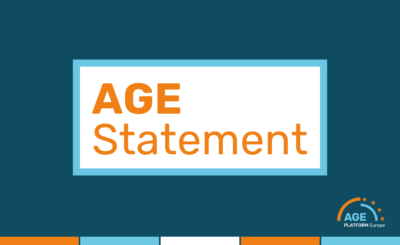
Changes in family structures are also impacting solidarity between generations. Although people live apart more than they used to do, family members from different ages tend to re-unite in difficult situations. As AGE highlighted in the European Youth Forum magazine YO!Mag, “in times of growing social inequalities and exclusion, solidarity is the answer and all efforts supporting intergenerational initiatives must be valued and supported”.
AGE survey reveals ingrained ageism
As a survey carried out among AGE members has showed, ageism is entrenched in attitudes but also in organisations, laws, policies and practices. This so-called “structural ageism” sustains ageist attitudes and can be encountered in the legal system, the media, health care provision and the economy, among many other areas. From the perspective of society, the failure to tackle age discrimination and ageism means that there we do not fully realize the positive contribution that older people have to make. And this lack of understanding has a serious impact on individuals.
Promoting and “integrating” age diversity in all areas of our societies is essential to combat age discrimination that arises from age prejudices and a lack of understanding of the situation of the other age groups, which in turn derives from a lack of interactions between the generations, as Prof Pearl Dykstra, from the Faculty of Social Sciences at the Erasmus University in Rotterdam, explained at AGE 2015 Annual conference, adding that there is “no mating without meeting”. Age-integrated societies need to focus on enabling cross-age interactions and friendships, promoting equal opportunities to active social participation for all age groups.
Joint event at the European Parliament called for greater EU attention

The event held at the European Parliament on 26th April was be the opportunity to build the case for intergenerational exchange and solidarity and ensure that young and older people are equal partners for the creation of fairer, more inclusive and sustainable societies. A variety of speakers, such as MEPs and NGO leaders, shared practices and perspectives of both age groups. This was followed by a debate open to audience to generate ideas and discussion. A report of the event will be posted on AGE website shortly. A joint press release was issued at the end of the event which can be read here
Useful links:






